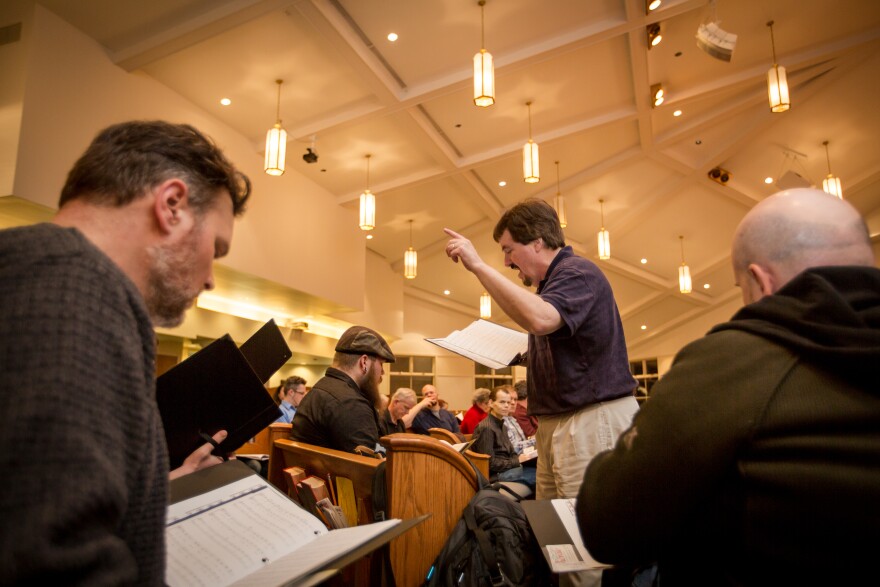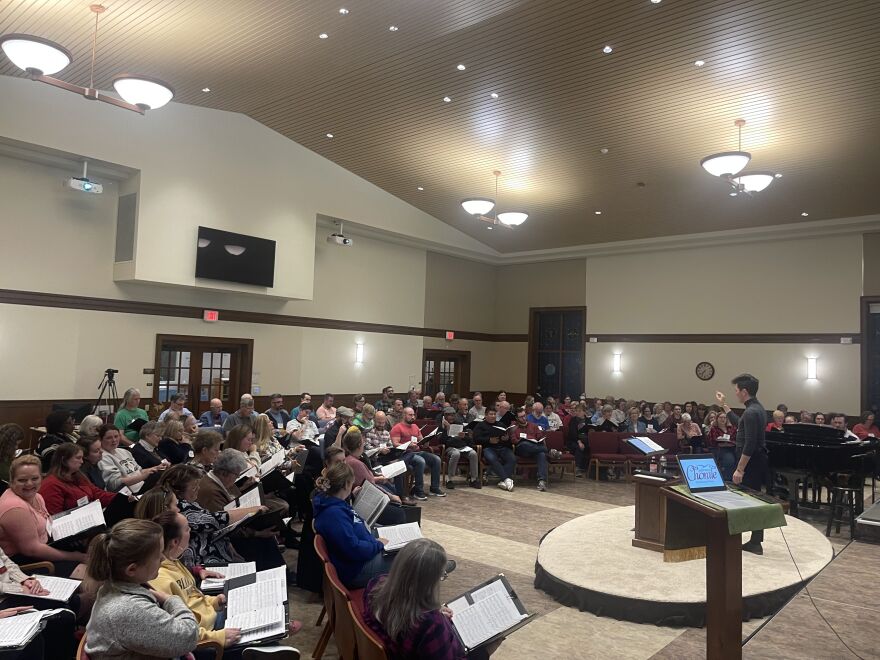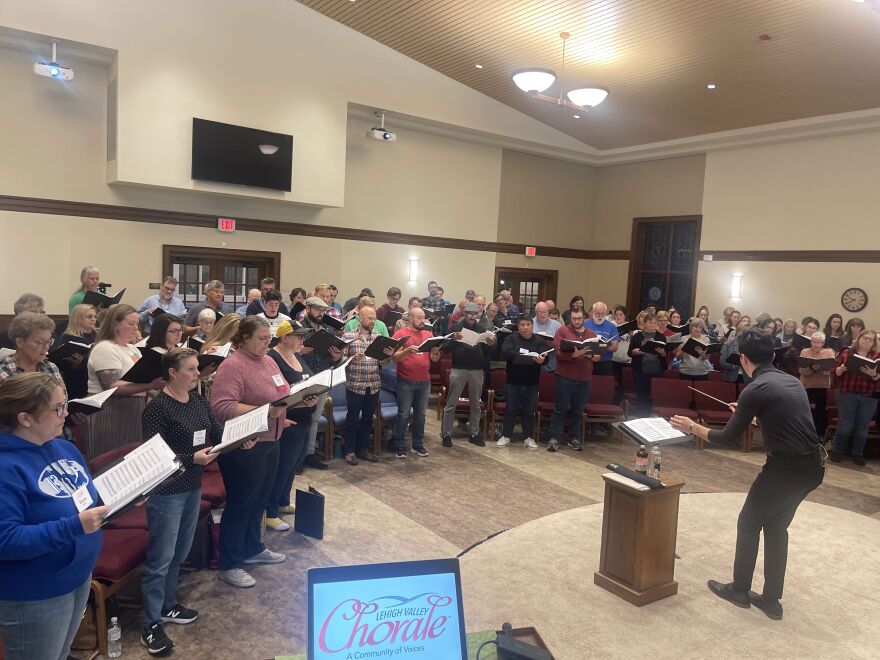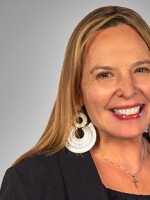- The Lehigh Valley Chorale's new artistic director and conductor, Nick Sienkiewicz, is now leading the group after the passing of their founder
- Ed Milisits, a former teacher in the Easton Area School District, passed away in January 2022
- The 153-member choir is gearing up for its December performances
EASTON, Pa. — On the heels of the pandemic, and after the passing of their beloved choir director, Ed Milisits, a local ensemble is on a path of healing — one note at a time.
Behind the Lehigh Valley Chorale's newfound joy is artistic director Nick Sienkiewicz, the conductor of the 153-member choir, aged 18-80.
"They needed to have fun. A lot of them knew Ed (Milisits) and had a very strong connection to him. When I came in, it was right after he had passed away. He was the only director, so to have someone new come in and try a bunch of new things. At that point, they just needed to enjoy themselves again. They needed to fall in love with music again," said Sienkiewicz, who was hired in August 2022.
Sienkiewicz, who leads the chorus with professionalism, and occasional bouts of humor, is working to take the chorale to new heights, introducing fresh ideas such as grant writing initiatives and establishing a diversity, equity and inclusion subcommittee.

'Everyone can sing'
The chorale was formed in 2016 under Milisits, a longtime Easton Area High School teacher, who retired from the school district in 2009.
He died at age 68 in January 2022.
His motto that "everyone can sing" paved the way for the choir's early success. Back then it consisted of about 40 people, some of whom were once Milisits' pupils.
"From last season to this season, we grew 43%. There has been massive growth and I think think a lot of that is the energy that Nick is bringing both in terms of his technical style and his youthful energy," Betty Walp, a chorale member since 2016 and the group's marketing manger, said.
"We formed with this foundational ideology of chorale music that is open to everyone but has very high standards of what we're going to do. That was Ed's tenet — everyone can sing, but you need to teach them how to do it and set them up to be successful."
The chorus group, which doesn’t require an audition to join, provides a unique and safe space where classically trained musicians and beginner singers flourish together.
Although every singer is accepted, the choir does have a small percentage of singers, called section leaders, who help answer technical questions and assist the troupe of sopranos, altos, baritones, tenors and bass.

"I don’t feel that anyone is necessarily better or worse at singing. We are all at a different place. Even the section leaders, that are auditioned positions, have learned a lot through working with individuals who can’t read music," Sienkiewicz said.
"For example, they learn by trying to convey markings in a score to someone who has never seen what that is before. They are constantly learning from each other."
The are two seasons — in winter and spring — that require singers to attend anywhere from 13 to 20 rehearsals.
All members are provided with sheet music and access to an app so they can replay their respective part which makes it easier to practice on-the-go.
Nathan Fehnel has been with the chorale since its inception and began as an amateur vocalist.
"I was nervous when I joined, but it's been amazing and I learned very quickly," he said. "It's a welcoming experience and for non-singers. The chorale provides structure in an open environment for all different musical levels."
Sienkiewicz's style of conducting combines techniques gleaned from his bachelor's degree from Western Michigan University and his master's degree from Indiana University in Bloomington, Indiana.
"In my undergrad (school) there were a lot of individuals who were in a music education program, so not necessarily for performance. I worked with people who needed assistance with vocal pedagogy, so in rehearsals we talk about technique and breath and I use gestures and metaphors," he explained.
"And then at grad school I worked almost exclusively with master students of opera, so I have two different experiences that influence the way I run my rehearsal strategies. Opera teaches things like efficiency and timing."
More than just vocal training
During a recent rehearsal for the chorale's upcoming December show, members greeted one another with hugs as the camaraderie filled the halls of Green Pond United Methodist Church in Bethlehem Township, where rehearsals are held.
A happy bunch, the longstanding choir members wear name-tags, so that new singers know who to ask for help.
Studies show that there are many health benefits to singing in a chorus. According to research from Oxford University, group singing not only helps to build social bonds, but is also helpful in improving breathing, regulating heart rate, muscle strain and posture.
For Alison Overdorf, it's a way to bond with family — her 87-year-old father, brother and daughter are also members — and expand her repertoire.
"I love the different styles of singing. As a family, we sing as a barbershop quartet, so it's totally different."
"I don’t feel that anyone is necessarily better or worse at singing. We are all at a different place. Even the section leaders, that are auditioned positions, have learned a lot through working with individuals who can’t read music."Nick Sienkiewicz, artistic director, Lehigh Valley Chorale
Representing diverse composers
Overdorf is equally impressed with this season's theme: "The Light That Leads Us Home," which combines a mix of modern-day tunes with classics like Antonio Vivaldi's "Gloria" and Morton Lauridsen's "Sure on this Shining Night."
"I am a 20th century and 21st century music person and we also have a value in the ensemble of representing diverse composers and underrepresented groups, so over 50% of all of our programs are by an underrepresented composer – women, BIPOC and LGBTQ," Sienkiewicz said.
Among the works appearing in the upcoming show are by contemporary artist Elaine Hagenberg, Black composer William Dawson, transgender composer Mari Esabel Valverde and "There's Gonna Be a Homecoming" by Kyle Pederson, which was featured in an episode of "Queer Eye."
Building a legacy
With the chorale's recent growth in membership comes the opportunity to build up the nonprofit, Sienkiewicz said.

Sienkiewicz, who lives in New York City, said they are looking into diversifying their financial portfolio with grant-writing and other professional endeavors — while maintaining a low-membership fee.
"Membership costs $45. We also have an elevated sponsorship level for individuals that want to give more," Sienkiewicz said. "That money goes to individuals who can't afford to join the chorale."
With Sienkiewicz's professional connections, some of the members will perform at the Grand and Festive International Choral Christmas Galaat Carnegie Hall in December.
It will be their second time taking the stage at the Manhattan venue famous for its elegant design and stunning acoustics.
Betty Walp's husband, David Walp, also a member since 2016, said he looks forward to group's next phase.
"There's been a lot of exciting leadership opportunities. We survived the passing of our founder and we've proven that we've got this part down. The singers are our core," David Walp, president of the chorale, said.
"Now we're thinking about where to go next. In addition to Nick's considerable musical talents, he also knows the business end of things. We are involved in something that can go on for generations to come and that's exciting," Walp said.
In their grief, members of the chorale are finding inspiration again, Betty Walp said.
"There's that phrase that I sometimes tease people with, 'youth is wasted on the young.' It is not wasted on Nick. He has the energy of a 24-year-old, but an old soul. He's done so much to heal this group.
"There was a moment when I thought I couldn't continue with the group, but I don't have that feeling anymore. I still love and miss Ed intensely, but Nick has infused the joy of singing and is building on the legacy of what Ed started," Betty Walp said.
The chorale's winter concert will take place on Dec. 1 and Dec. 2 at First Presbyterian Church, 3231 Tilghman St., Allentown.
To learn more about joining, click here.

